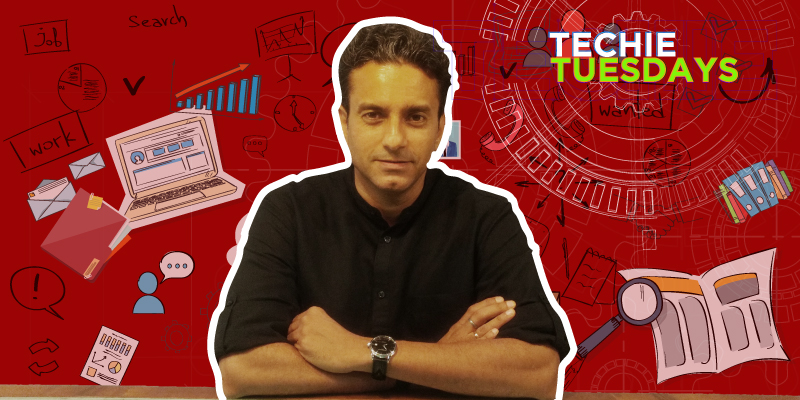
Meet Vibhore Sharma – the self taught technologist who’s CTO of Naukri.com
Meet Vibhore Sharma – the self taught technologist who’s CTO of Naukri.com https://csuiteold.c-suitenetwork.com/wp-content/uploads/2017/08/meet-vibhore-sharma-the-self-taught-technologist-whos-cto-of-naukri-com.jpg 800 400 C-Suite Network https://csuiteold.c-suitenetwork.com/wp-content/uploads/2017/08/meet-vibhore-sharma-the-self-taught-technologist-whos-cto-of-naukri-com.jpgVibhore Sharma’s story is a testimony to how passion trumps everything. He lost his father while he was still in school and couldn’t go to college. He had to start working early to support his family, but he didn’t let it come in his way. Our Techie Tuesdays of the week, Vibhore is the CTO of Naukri.com, the company he joined almost 16 years ago.
To know Vibhore Sharma is to know Naukri.com, the company he has been associated with for the past 16 years. This is quite an achievement for someone who was questioned everyday by his mother if he still held a job.
It is safe to say that Vibhore has gone through more ups and downs than most people. But he emerged from the throes of life’s challenges as a stronger individual who has his priorities straight. Our Techie Tuesdays of the week, Vibhore is currently the CTO of Naukri.com, India’s largest jobs portal.

Now would you believe if we tell you that he has never gone to college? But he was neither the college-dropout prodigy nor that person who did not have faith in the education system.
From his first job of selling compressors to now leading the technology efforts at India’s largest jobs portal, Vibhore has come a long way. He now works on one of the largest databases of people in the country.
He spoke to YourStory recently about his journey and how he is putting Naukri.com at the forefront of next-gen tech companies.
Related read – Sandipan Chattopadhyay — the statistician behind the 160x growth of Justdial
The superman childhood
Vibhore was born and brought up in Delhi in a middle-class family. His father was a mechanical engineer and Vibhore grew up looking at blueprints of machines and sketches of compressors.
He recollects being an extremely mischievous kid. In fact, his mother once tied his legs to make sure that he remained in her line of sight while she continued doing household chores.
Though he loved comic books, his family couldn’t afford buying them.So he rented them. Such was his love for superheroes, that he and his friend once fashioned capes out of towels and jumped off the first floor! Thankfully, the friend just had a broken bone, while Vibhore escaped with a few scratches.
In school, Vibhore spent a lot of time playing football. He loved organic chemistry. and opted for the Maths-Biology stream in Class XI.
Flipping the switch
Vibhore’sfather passed away when he was in Class XII, succumbing to a cardiac arrest whilst touring Kolkata. Vibhore recalls,
I replay the time I heard the news in my head many times, but I still don’t know what was the first thought in my head; was it – ‘Oh! I lost my dad!’ or ‘Who’s going to earn the daily bread now?’
That was the moment when he flipped a switch. He had two choices after school – either join the forces or pursue literature in college. Since his mother didn’t let him go to the army, Vibhore was considering applying for admission to one of the DU colleges. He says, “While filling the form, a thought occurred to me: my mother has never worked at a job all her life but was now working. So I asked myself how I could go to college and have a blast while she was slogging.”
Vibhore’s father had had no savings. He says, “We were rebuilding the house, for which he had taken a loan from his friend. We didn’t have any money then. There was no way I could be without helping my mother.”
He, therefore, decided to skip college, and instead started working for his uncle, selling compressors.

Job #1 – selling compressors
It wasn’t easy for Vibhore as, at 17, he didn’t have a clear sense of what was expected of him. Moreover, he felt out of place, surrounded by mechanical engineers and other qualified people. He says, “But you gotta do what you gotta do!And survival teaches a lot of sense.”
Vibhore read up on the subject and spoke to people in order to better understand the products he was selling. He had to go to remote locations in Punjab and Uttar Pradesh to sell these products. He says,
I had no idea that I could do this. But I went about doing it. It was tough in the beginning. There were many times when people asked me to leave and send someone senior instead.
In order to come across as more experienced, Vibhore tried to look more mature and started hanging out with clients in the evenings to break the ice.
Finally, after three years at it, Vibhore left the job. He says,
This was the foundation for me, which got me thinking that survival was fundamental and taught me that if you don’t know something, you can figure it out along the way.
Also read – How a small-town commerce graduate became CTO of a multibillion-dollar company
Job #2, #3, #4…
Vibhore then worked as a medical representative for some time. But very soon, he hit upon an idea of making a movie. He landed at Miditech, a TV production company, as a production controller. His job was to essentially manage logistics of all possible shoots. He would’ve gotten an assistant producer gig soon enough, but he didn’t want pursue that path. So, instead he made friends with a couple of editors and camera persons, and learnt their skills. But seeing that his movie dreams weren’t taking flight, Vibhore returned to the pharmaceutical industry. He joined US Vitamins.
This time around, the job was very challenging as he was expected to sell a complicated line of products:a low molecular weight drug called Heparin, which is administered to patients who have been bed-ridden for a long time. He had to often visit specialist hospitals and meet with cardiovascular thoracic surgeons. Things seem to be looking up and Vibhore felt he had finally figured out what he wanted to do.
His mother, however, feared that Vibhore would leave his job. History made her worry so. He says, “She used to ask me everyday when I got back home if I am still continuing at my job. I had changed multiple jobs my now. Sometimes it was within a month’s gap, sometimes more than that.”

Orange books and introduction to programming
Around the same time, Vibhore’s brother was pursuing the popular GNIIT course at NIIT. He used to drop him to the class on his scooter and then proceed to work. But something about the computer books with orange covers and the 1.44-inch floppy drives he carried around triggered curiosity in Vibhore.
Curiosity soon blossomed into keen interest in exploring the idea of learning computer programming. He then joined a six-month full-time course CMC was offering. He recalls, “It was 1999 and I thought that if I go for a part-time course for a year we may hit the Y2K (bug), so we decided to go for a six-month course to fall in the window (and exploit) between finishing the course and the potential bubble burst(Y2K).”
His mother didn’t think it wise to leave a job that was paying him well. He had pooled all his savings to join the diploma course, which promised to teach multiple programming languages in six months.
This was the first time Vibhore worked on computers. “I recall my first impression of computers –being that they were better than calculators,” Vibhore exclaims.
Within a week of joining class, he was told lessons on C++ was done and over with. Vibhore was mortified, because he did not know anything. He then convinced the computer lab in-charge to allot him a system to work on in the evenings and nights. He spent hours hunched over the computer, putting much more effort into learning than he ever did in his school days.
You may also like – Meet Sauvik Banerjjee, a Ranji trophy player who went on to architect Reliance Jio
‘It’s greater than zero’
At the end of the computer programme, Vibhore was back at square one, wondering what his next step should be. Meanwhile, CMC offered him a teaching job at the centre and he accepted that. It was paying him less then one-third of what he was getting in his previous job, but that did not matter to the young man. Vibhore says, “The salary was just greater than zero. But it was the excitement of the craft that got me into computers. I still hold that excitement for it.”
Vibhore recalls working on an interesting assignment that he got during 1999 general elections. He says, “We worked on real-time data. We had to process the data feeds coming in from the elections using some FoxPro programs and send them back from the terminals at CMC.”
Unfortunately, that branch of CMC shut down in a few months and Vibhore was left facing the now familiar question of ‘what next?’ After some time, he decided to get back to sales and joined Information Technology in India Limited(ITIL), a subsidiary of Usha Group. They were building MyUsha.com, on the lines of MyYahoo, which would have news feeds, searches and more. Vibhore helped the company collect data of restaurants.
He soon started hanging out with the programmers in office and started helping them with the code that would eventually go into setting up the website). It was primarily Perl and .net.
Meanwhile, data gathering work discontinued and the company formed an editorial team. Vibhore joined as a reporter, besides continuing his nightly coding adventures. He used to go to the offices of news wire agencies like PTI, UNI and AFP in the evenings to gather relevant news to upload on the website. He also started making ads for the company around this time. A feather in Vibhore the Reporter’s cap during this stint was an interview with Kiran Bedi.



